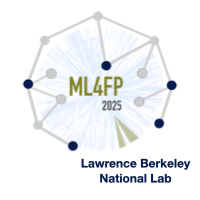Machine Learning for Fundamental Physics School (ML4FP) 2025 will be held at Lawrence Berkeley National Laboratory (LBNL) August 4-8th, 2025!
Note: Payments during registration
Please use the link to the LBNL payment portal to complete your registration. Fill in all the required details and submit the registration fee.
Please note that you may need to re-enter many of the details on the LBNL portal, even if you've already filled them on Indico.
We invite particle physicists from different sub-field to join us and spend a week at LBNL for ML4FP, where a wide range of machine learning methods for particle physics development will be covered. The learning materials (hands-on examples) are deeply connected with real experimental applications. Meanwhile, we also encourage our theorist friends to join ML4FP as the machine learning tools and methods are general. Through this platform, we appreciate discussions for current and future use of machine learning mathods in various aspects of particle physics. We put particular emphasis on the hands-on tutorials with realistic examples to help participants to dive in the machine learning world for their research needs.
ML4FP evolved from the US ATLAS machine learning training events in 2022 and 2023. Since 2024, we have broaden the horizon of this program and opened it to all particle physicists with a dedicated sssion for CMS and in 2024 we also had an LZ session. This year, we will include a session for neutrino physics with a focus on the accelerator neutrino experiments! We have scheduled parallel sessions the last day of the school for dedicated tutorials and discussions of machine learning uses in ATLAS, CMS and neutrino physics. Participants from other experiemnts (including LZ) as just as welcome to attend.
The school is open to all enthusiasts working in particle physics who wish to advance their knowledge in machine learning. Thanks to the ATC program by US ATLAS, there will be financial assistance to support most US ATLAS students in double-occpancy hotel rooms near LBNL (we cannot cover airfare).
We strongly encourage in-person participation of the school for futher discussions. Come to meet your future collegues! In the meanwhile, we understand potential difficulties for in-person attendence. Therefore, we open the registration to remote participants who plan to follow the school closely in real time and may request GPU resources. The materials of ML4FP including the lecture slides, recordings and tutorials, will be made publically available.
The registration fee for in-person participation is 40 USD, which includes coffee break refreshment and NERSC GPU access during ML4FP 2025. For remote participants who will request GPU resources during the ML4FP tutorial hours, the registration fee is 10 USD. We will also have a registration option for participants who simply want to audit the school without requiesting GPU resoruces, without a fee. We will not be able to provide technical support to participants using other computing resources.
Program overview:
We will introduce foundational concepts of machine learning and provide tutorials of the essential open-source ML packages. The program will cover a range of particle physics topics with hands-on tutorials. With the examples of ML applications in particle physics, the participants will learn detailed considerations required for reliable deloyment of ML in particle physics.
Tentative topics (many will include a hands-on component):
- Introduction to ML
- Introduction to standard open-source ML packages like Scikit-learn, Tensorflow and Pytorch
- Overview of ML in particle physics
- Overview of network architectures: symmetry preserving networks, transformers, and others
- Generative models
- Anomaly detection
- Neural simulation-based Inference
- Uncertainty quantification
- Differentiable programming
- Deploying neural networks in real-time environments: quantization, model prunnning and compression, HLS4ML
The full agenda will be finalised in July.
Industry Talk:
In previous years we had speakers from Nvidia (Jaideep Pathak), Amazon (Chen Luo) and Google (Kanishka Rao) talk about their transition to industry and their research work in these companies. We plan to have another insightful industry talk this year.
Computing Resources:
In-person and remote participants who register with a request to access GPU resources (registration fee required) will have NERSC training accounts valid for the week during ML4FP 2025.
Networking:
Past schools have led to new research collaobrations. This year's school will be another opportunity for young ML enthusiasts to connect with veteran ML experts in HEP.
Tutorial git:
Github link: https://github.com/ml4fp/2025-lbnl
Zoom: Link will be sent to registered participants
Slack: Invitation will be sent to registered participants
Join the slack workspace to discuss and ask questions about the tutorials, particularly for the remote participants.
Organizing team:
Aishik Ghosh, (UCI & LBNL) [ATLAS and Neutrino Liason]
Elham E Khoda (SDSC/UCSD)
Benjamin Nachman (SLAC, Stanford)
Sascha Diefenbacher (LBNL) [ATLAS Liason]
Oz Amram (Fermilab) [CMS Liason]
Yifan Chen (SLAC, Stanford) [Neutrino Liason]
Steering Committee:
Daniel Whiteson (UCI)
Shih-Chieh Hsu (UW)
Steven Farrell (NERSC/LBNL)
Benjamin Nachman (SLAC, Stanford)
Aishik Ghosh, (UCI & LBNL)
Elham E Khoda (SDSC/UCSD)

